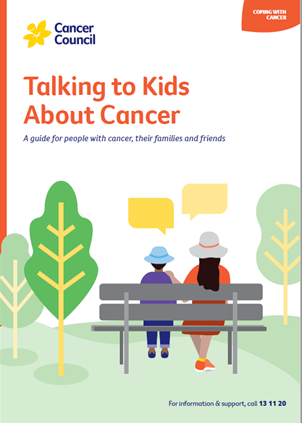- Home
- About Cancer
- Family and friends
- Talking to kids about cancer
- Talking about treatment
- Answering common questions about treatment
Answering common questions about treatment
Find thoughtful ways to discuss treatment with your kids. Learn how to answer their questions about cancer treatment calmly.
Cancer doesn’t always cause pain, and if it does, the pain can be relieved or reduced. How you answer this question will depend on the child’s age.
For younger children, you may say: “Cancer doesn’t always hurt, but if I have pain, the doctors will give me medicine to help make it go away.”
For older children and teenagers, you may say: “The cancer treatment may cause me pain. The doctors can give me medicines for pain, but I might have good days and bad. I’ll let you know if I am having a bad day.”
Often people who have cancer look perfectly well when diagnosed. It’s only when they have treatment and the side effects kick in that they start to look sick. This can be hard for children to understand.
A: “The doctors are using strong medicine to kill the cancer, but the medicine affects good cells as well as cancer cells. Some days I might feel and look sick, but this doesn’t mean the cancer is getting worse. I will start to feel better when treatment finishes.”
Hair loss can be upsetting for you and your children, so it can help if the family knows what to expect and what you might do about it.
A: “The doctor says I may lose my hair because of the chemotherapy. I can wear wigs, scarves or hats until it grows back.”
A common fear among children is that they can become radioactive by touching you after radiation therapy. With most types of radiation therapy, this is not possible. Your doctor will tell you if you need to take any precautions.
A: “Radiation therapy is like an x-ray. It doesn’t hurt. It’s safe to touch me.”
Children often can’t understand the exhaustion you may feel after treatment. They may resent you not doing as much with them.
A: “The operation/treatment I’m having has made me tired and I need to rest so my body can recover. Let’s make a plan for what we’ll do on a day I have more energy. Perhaps today we can do something quiet like watch a movie.”
→ READ MORE: Family life during treatment
Podcast: Explaining Cancer to Kids
Listen to more episodes from our podcast for people affected by cancer
More resources
Prof Jane Turner AM, International Psycho-Oncology Society President Emeritus,The University of Queensland, QLD; Taylor Baker, Consumer; Dr Ben Britton, Principal Clinical and Health Psychologist, Head of Psychology, Hunter New England Mental Health, NSW; Camp Quality; Dr Lisa Cuddeford, Head of Department, WA Paediatric Palliative Care Service, Perth Children’s Hospital, WA; A/Prof Peter Downie, Head, Paediatric Haematology–Oncology and Director, Children’s Cancer Centre, Monash Children’s Hospital, VIC; Dr Sarah Ellis, Clinical Psychologist, Kids Cancer Centre, Sydney Children’s Hospital, NSW; Malia Emberson-Lafoa’i, Consumer; Kate Fernandez, 13 11 20 Consultant, Cancer Council SA; Jane Gillard, Consumer; Mary McGowan OAM, International Childhood Cancer Advocate, VIC; Annette Polizois, Senior Social Worker, Women, Family and Emergency Care Team, Royal North Shore Hospital, NSW; Rhondda Rytmeister, Clinical Psychologist, HeadWayHealth (formerly Snr Clinical Psychologist, The Cancer Centre for Children, Westmead, NSW); Nadine Street, Head of Social Work and Social Welfare, HNE Mental Health Service, NSW; Warren Summers, Online Counsellor, Canteen, NSW.
We would also like to thank the health professionals, consumers, organisations and editorial teams who have worked on previous editions of this title, and we are grateful to the parents and young people whose real-life stories have added to the richness and relevance of this book.
We thank and acknowledge Dr Paula K. Rauch, MD, Founder and Director, Marjorie E. Korff PACT (Parenting At a Challenging Time) Program and Associate Professor of Psychiatry, Harvard Medical School, whose research and writing on helping parents talk to their children about cancer was used as source material for this book and has been adapted in several sections: pages 8–11, How children understand cancer; page 22, Answering key questions: Are you going to die?; page 26, Involving the school or preschool; pages 30–31, Hospital visits; and pages 36–37, Encouraging family time. We also thank the American Cancer Society for permission to use and adapt material on pages 8-11 from its book Cancer in Our Family: Helping children cope with a parent’s illness (2013); Macmillan Cancer Support for permission to use its book Talking to Children and Teenagers When an Adult Has Cancer (2013) as a source of information; Jessica Watt, Oncology Social Worker, The Children’s Hospital at Westmead, for her contribution on page 20, When another child has cancer; and Diane McGeachy, Hobart Counselling Centre, for contributing material for page 37, Spending one-on-one time.
View the Cancer Council NSW editorial policy.
View all publications or call 13 11 20 for free printed copies.

